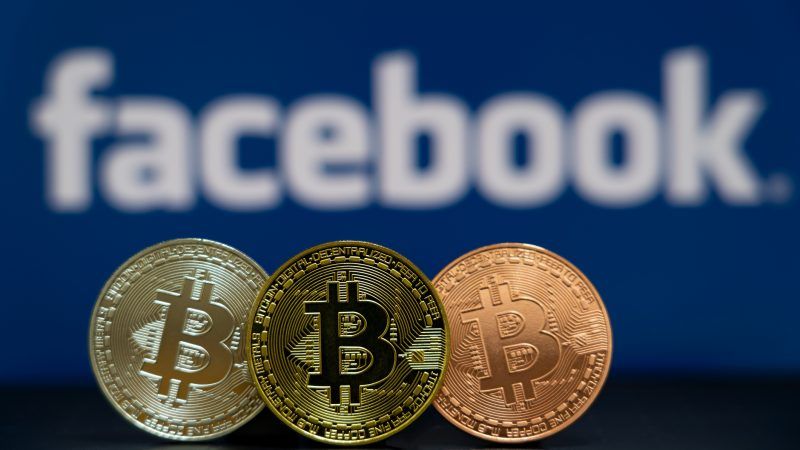Facebook's Libra 'Cryptocurrency' Aims to Disrupt Payments. Bitcoin Aims to Disrupt Government Power.
Mark Zuckerberg’s latest venture won't compete with Satoshi Nakamoto’s project for undermining central banking, tyranny, and the financial surveillance state.

Bitcoin has the capacity to undermine government control of money because you can freely exchange it with anyone in the world, meaning that no government or government-regulated entity has the capacity to interfere with its use. Because its supply is fixed at 21 million units, it also can't be watered down by inflation.
Facebook's new "Libra" coin, which was announced today, is both an interesting project to improve global payments and a useful reminder that Silicon Valley can't ever compete with bitcoin's mission of reclaiming control of money from the state.
The social networking giant is launching Libra in partnership with MasterCard, PayPal, eBay, Uber, Lyft, and several other tech heavyweights. Facebook claims that it has the potential to become the first "internet of money" with the capacity to modernize the way value moves around the world and to help provide financial services to the 1.7 billion adults without banking services. In the tradition of bitcoin's pseudonymous creator Satoshi Nakamoto, the company released a "white paper" this morning that lays out the basic details. Given its dismal record with customer privacy, Facebook has wisely created a new nonprofit entity based in Switzerland to oversee the project.
All the hype should be tempered by the existence of an internet graveyard filled with attempts to bring payments into the online age, which date back to the launch of the web (FirstVirtual, Cybercoin, Millicent, Digicash, Internet Dollar, Pay2See, MicroMint, Cybercent, Flooz, Beenz, CyberCash, BitPass, Peppercoin, etc.). But Libra is a genuinely interesting project because it will bootstrap on a much larger network than the failed ventures that came before it. Facebook's WhatsApp alone has 1.5 billion active users in 180 countries.
Libra is best understood as PayPal 2.0, and yet the white paper invites specious comparisons to bitcoin, noting that "existing blockchain systems have yet to reach mainstream adoption." Bitcoin launched a decade ago, yet its developers are still working out fundamental engineering problems, such as how to scale the technology to service billions of transactions a day. Libra, in contrast, will launch out of the gate with the capacity to "scale to billions of accounts," with "high transaction throughput, low latency, and an efficient, high-capacity storage system."
The difference is that bitcoin is a decentralized technology that nobody controls, which creates enormous engineering challenges in security and scalability that are being solved using complex cryptography. This is a decades-long project. Libra's engineering hurdles are comparatively simple because its a centralized payment system run by a bunch of big companies. The white paper uses bitcoin buzzwords like "blockchain," which should be understood as marketing hype. Libra is fundamentally a top-down system that runs using a database, which will never change.
Why is bitcoin's decentralization worth all that extra time and effort? Because governments can't stop it. So sex workers and porn stars use it when they're denied bank accounts, drug users use it to buy banned substances through an online bazaar, it enables Venezuelans to circumvent capital controls for buying food and medicine from abroad, and Brazilians can use it to get around import taxes that run as high as 60 percent.
Libra, on the other hand, will be controlled by a handful of big companies that will have no choice but to comply with government dictates, and the white paper makes it clear that the nonprofit running the project will collaborate with regulators.
Bitcoin is also resistant to government inflation, with a supply that's capped at 21 million units. Libra will function like a central bank, with its value propped up by a basket of "bank deposits and short-term government securities" held in reserve. In Venezuela, where the government-issued bolivar is losing value at a rate of about 1 million percent per year, users could hypothetically store their money in the Libra. And in the short-term, the Libra will likely be less volatile than bitcoin, which is currently valued at less than half of its December 2017 high. (Though it has also risen 154 percent in dollar terms so far in 2019.)
The problem is that in Venezuela (like in China, Iran, and India), Bitcoin is used despite government opposition. Why would the Maduro regime tolerate a competing currency run by a bunch of U.S. companies? Keeping the Libra out of Venezuela will be much easier than quashing bitcoin, which is designed for the purpose of resisting government censorship.
In short, Facebook's Libra has the potential to disrupt payment processing companies and other financial services. Bitcoin has the potential to disrupt central banking, the surveillance state, and government power around the globe.


Show Comments (51)